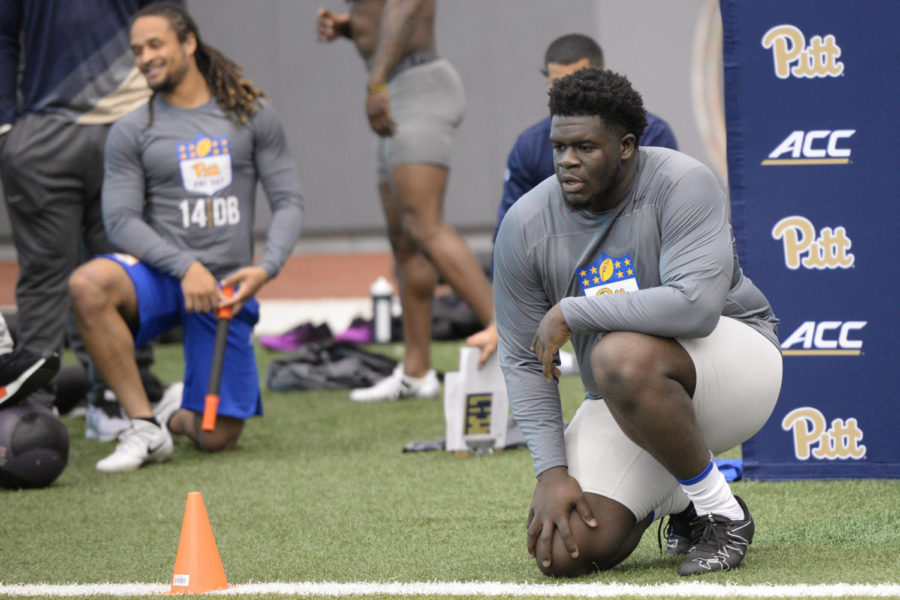Former Pitt lineman Alex Officer diagnosed with bone cancer
Former Pitt offensive lineman Alex Officer at Pitt Pro Day on March 21. (Photo by Mackenzie Rodrigues | Contributing Editor)
September 25, 2018
Alex Officer, a former standout on Pitt’s offensive line, announced last week that he was diagnosed with osteosarcoma, an extremely rare form of bone cancer affecting fewer than 1,000 new patients each year in the United States. When discovered early on — as Officer’s was — the treatment has a success rate of roughly 70 percent.
Officer, who started 49 games at offensive tackle from 2013 through 2017, helped pave the way for three 1,000-yard seasons from tailbacks James Conner and Qadree Ollison during his time as an interior lineman.
“Our hearts and prayers are with that family, with [Officer] … we’re trying to help him along this process because he’s a forever Panther,” Pitt football head coach Pat Narduzzi said last Thursday. “A.O. is quiet, he’s tough.”
Although Officer was not drafted to the NFL in the spring, he participated in training camp tryouts with three NFL teams, including the Kansas City Chiefs, who ended up releasing him in August for failing to disclose a physical condition — a nagging pain in his knee that impacted his physical performance. Officer came back to Pittsburgh to get an MRI on the troublesome joint after he was released and discovered he had a tumor.
To help pay for the upcoming operations and treatment of Officer’s condition, his older brother Jerome Lewis set up a GoFundMe page with the goal of raising $100,000. The donations nearly reached the goal’s halfway mark as of Tuesday night, with 639 people giving $46,333.
Narduzzi further emphasized the importance of giving to his former player’s cause.
“When you get a job, you get insurance,” Narduzzi said. “That’s why that GoFundMe page is so important — he doesn’t really have insurance, so all the help that he can get right now is going to be important for him to help pay some bills.”
The online fundraising page reiterates the “strong but silent” mentality Narduzzi praised, calling Alex “one of the most humble and selfless individuals,” but also championing his strength, as “Alex is a self-named ‘Dawg’ and will win his fight”.
His brother agrees. The first thing Lewis mentioned about Officer was his determination.
“Where we’re from, to get somewhere you have to earn it,” Lewis said in an interview with The Pitt News.
Beyond his environment growing up, Lewis also mentioned Officer’s mother as a huge influence on his life. However, he made it clear that despite his background and support, Officer is a self-made man. He’s quiet, he’s humble, but also strong and incredibly driven — the qualities that led him to succeed as a Division I athlete.
Beyond his successful college career, Officer wants more out of football. Despite his diagnosis and the setbacks it entails, Lewis said Officer is still very much planning on making it to the NFL. He will begin treatment this week, but even so, he has no plans on taking it easy. He will continue to train and stay in shape, improving his body along with his health in order to meet the ultimate goal of playing in the NFL.
Lewis said that Officer remembers fondly the atmosphere at Pitt and the bonds he formed with his teammates.
“It’s silly to consider myself Alex’s only brother because all his teammates were as well,” Lewis said. “The best part of Pitt was that it felt like family.”
Lewis said Officer’s former teammates Justin Moody, a defensive tackle who was forced to end his playing career due to a spine condition as a junior, Qadree Ollison and fellow cancer survivor James Conner reached out to Officer to provide some support.
Conner has been an especially big help, as he went through his own battle with cancer, specifically Hodgkin’s Lymphoma, in 2015. Conner was able to overcome the issue and now plays for the Pittsburgh Steelers. He’s already reached out to provide insight and advice for Officer on the adjustments he will have to make.
Lewis also expressed thanks to the Pittsburgh community, the University of Pittsburgh, head coach Narduzzi and the other staff for their ‘Panther forever’ commitment, and how they’ve always been there to provide support for Officer even after graduation.
“The diagnosis has been extremely difficult for our family,” Lewis said. “It’s been a hard time, but they’ve been there every step of the way. Their support has been humbling.”



